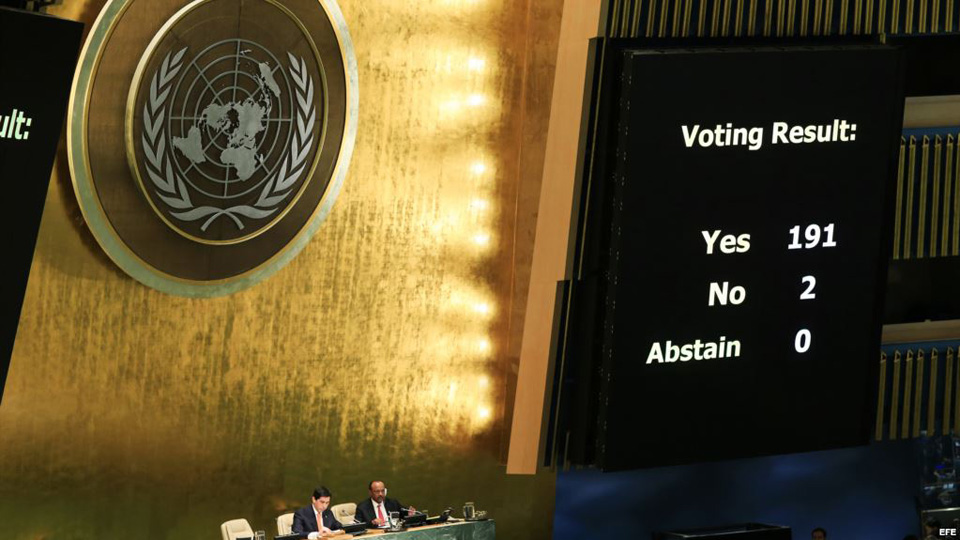
The United Nations General Assembly on November 1 revisited what has become by default an annual ritual. Once more member nations voted overwhelmingly in favor of a Cuban resolution calling for an end to the U.S. economic, commercial, and financial blockade of Cuba. The vote this time was 191 nations in favor and two against—Israel and the United States.
Last year, those two nations abstained. The switch this year to a “No” vote reflects a resurgent offensive against Cuba by the Trump administration as it reverses the easing of bi-national relations on President Barack Obama’s watch. In June, President Trump announced plans to tighten restrictions on U.S. travel to the island and to close any U.S. business dealings with Cuban entities associated with the military there.
In September, his administration withdrew 60 percent of diplomatic personnel stationed at the U.S. Embassy in Havana and evicted 15 Cuban diplomats from Cuba’s Embassy in Washington. A supposed epidemic of “sonic attacks” against U.S. Embassy personnel served as pretext for both actions.
U.S. Ambassador to the United Nations Nikki Haley defended her nation’s vote in the Assembly and its policy of blockade, in effect for almost 60 years. “Our principles are not up for a vote,” she indicated; they are “enshrined in our Constitution.” The Ambassador justified the U.S. return to voting “No,” and no longer abstaining, by the fact there is a new U.S. president. She didn’t mention that opinion surveys in the United States for several years have registered strong public support for ending the blockade.
Haley declared that “As long as the Cuban people continue to be deprived of their human rights and fundamental freedoms, the United States does not fear isolation in this chamber or anywhere else.” After testifying to deep U.S. friendship with the Cuban people, Haley left the podium to the accompaniment of booing from the delegates.
Speaking to them, Cuban Foreign Minister Bruno Rodriguez defended Cuba’s Resolution and criticized Haley for being “disrespectful” of the General Assembly. He noted that “Haley speaks on behalf of an empire” that violates international law and fights cruel, unjustifiable wars. He also portrayed the blockade as harming all Cuban families and criticized the United States particularly for depriving Cuba of life-saving medicines.
Representatives of many nations, representing all regions of the world, followed each other, one by one, in denouncing the U.S. blockade. They emphasized violations of morality and international legal norms. Several condemned the abusing of human rights within the United States and especially at the U.S. prison in Guantanamo. Cuba received praise for its high standards of education and health care and for its solidarity with peoples of the world, in particular its anti-apartheid intervention in southern Africa.
For 26 years, nations voting in the General Assembly have overwhelming refused to support the blockade and done so with remarkable consistency. Since 2010, at least 187 nations have voted annually in favor of the Cuban Resolution and only once have as many as three nations opposed it. The United States and Israel have always accounted for two of them. Voting in 2016 broke the mold when no nation opposed the resolution.
Between 1992 and 2000, the “Yes” votes rose from 59 to 169, while the number of nations abstaining fell progressively from 71 to four. Meanwhile, nations absenting themselves from the vote dropped from 46 to 15. Those trends continued for the next ten years. From then on, near unanimity has prevailed.
In the build-up to the United Nations vote, U.S. activists in solidarity with Cuba demonstrated their opposition to the blockade with a “twitter storm” the week previous and with “Days of Action Against the Blockade” staged in Washington in September by the International Committee for Peace, Justice, and Dignity. On November 1, the day of the vote, anti-blockade demonstrators were in the streets in 12 U.S. cities.
One day prior to the vote, ten Democratic senators complained in a letter to President Donald Trump that non-stop U.S. backing in the United Nations for an “outdated policy” undermines the country’s international credibility. On learning that a “No” vote was in the works, Sen. Patrick Leahy (D-Vt.) condemned that posture as “reflexive and baseless,” and called it a “regrettable mistake.”
In her speech before the General Assembly justifying the U.S. position, Ambassador Haley dismissed debate surrounding the Cuban resolution as “political theater.” Actually, the occasion provides Cuba with a high-profile forum for informing and reminding world opinion about the harm suffered by the Cuban people at the hands of a government intent on undermining another nation’s sovereignty.
Cuba’s Foreign Ministry in October issued a detailed report documenting shortages, monetary losses, and inconveniences resulting from the U.S. blockade. Surely, efforts to identify the source of such distress, and to seek redress, fit with any government’s duty to protect its people.
In fact—as noted by Bolivian President Evo Morales on Twitter—“The peoples of the world are with Cuba… Solidarity is confronting the empire’s wretchedness.”












Comments